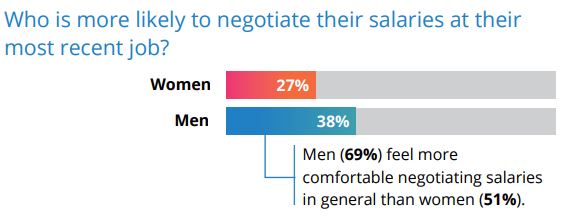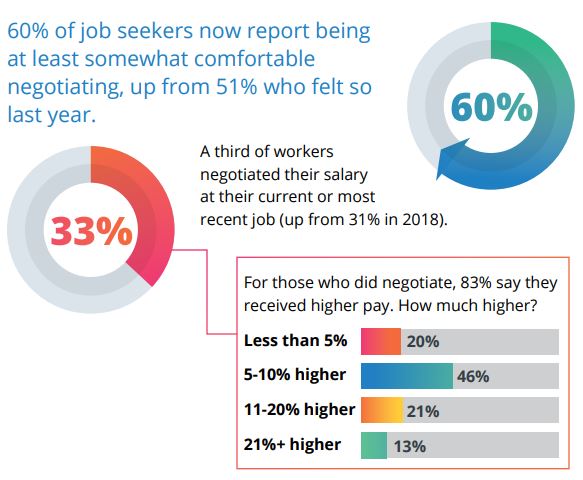
4 min read
The basic formula to build wealth is as follows:
(1) Generate income.
(2) Save a portion of that income.
(3) Invest those savings into assets that will grow over time.
And it’s no secret that it’s easier to build wealth on a high income. Someone who earns $100k and only spends $40k per year will clearly accumulate wealth faster than someone who earns $50k and also spends $40k per year.
And while I believe the best (and most enjoyable) way to generate income is by starting your own business, it’s a fact that most people will have to work for an employer at some point in their life.
For these people, one of the fastest ways to increase their income is to negotiate their salary. A simple 10-minute conversation could lead to thousands of additional dollars in compensation. It’s hard to find a better return on investment per minute than that.
Unfortunately, a 2019 study from Jobvite shows that only 33% of people actually bother negotiating their salary. Broken down by gender, the numbers are even lower for women: only 27% negotiate salary.

But there’s good news for those who do negotiate: a whopping 83% receive higher pay as a result.

And about one-third of people who negotiate salary end up receiving pay that is 11% or higher. For someone who receives an offer of $60k, an 11% increase would be an additional $6,600. That’s a lot of money for only a little work.
For those who are willing to negotiate, there’s significant upside. But it helps to know which techniques and tactics can actually help you negotiate a higher salary.
In this post, I share a list of helpful negotiation tips that I’ve come across from a few different places on the web.
Patrick McKenzie on salary negotiation
If you’re only going to read one article on salary negotiation, make it this one. Patrick McKenzie, an engineer who currently works for Stripe, shares a plethora of helpful tips on the psychology of negotiating along with specific tactics on how to effectively negotiate. I encourage you to read the whole article, but here are a few of my favorite takeaways:
1. Rich, successful people negotiate. Period.
2. Contrary to popular belief, an employer won’t feel offended if you ask for more money.
3. A lot of money to you (e.g. $5,000) isn’t a lot of money to your prospective employer.
4. Suppose the person hiring you is named Bob. You need to recognize that Bob is not spending Bob’s money to hire you. Bob is spending Bob’s budget that he received from the company. You’re not putting Bob in an uncomfortable position by asking for more.
5. If you even reach the point where you’re negotiating on salary, that means the company has spent thousands of dollars just talking to you. It would actually make more economic sense for them to give you an extra $5,000 than to start interviewing a brand new candidate.
6. Never give a salary number first. If they insist that they need a number, say something like “I’m more concerned at the moment with talking to you about discovering whether we’re a mutual fit. If we’re a great fit, then I can be flexible on the numbers with you and you can be flexible on the numbers with me. If we’re not a great fit, then the numbers are ultimately irrelevant, because your company only hires A players and I only work at roles I would be an A player at.”
7. Focus on talking about “mutual wins” rather than making the negotiation process a you vs. them battle.
8. “Interesting” is a wonderful word: it is positive and non-commital at the same time. If they tell you a number, tell them it is an “interesting” number, not a “wonderful” number.
Laura Helmuth on salary negotiation
About a year ago, Laura Helmuth shared an awesome Twitter thread about salary negotiation. The whole thing is worth reading, but here are a few of my favorite ideas from the thread:
1. “If they’re offering to hire you, they probably had a long job search process and really want it to come to a satisfactory conclusion for all of you, YOU included.”
2. “Do not accept any offer immediately, no matter how great it sounds.”
3. “Talk to people about the offer. It’s awkward to talk about money, but ask people with experience in your industry if they would be willing to help you evaluate the offer. If you’re in science writing, ask me.”
4. “You don’t need to have a reason why you need a higher salary (you don’t have to say you’re paying off student loans, for instance). BUT, if you are changing jobs and this would be a salary cut, you can let them know that.”
5. “You may be able to negotiate other things rather than pay – working remotely, more vacation, career development, etc. It’s not all about the money.”
Stephanie Hurlburt on salary negotiation
Another excellent Twitter thread on salary negotiation comes from Stephanie Hurlburt. Here are some of my favorite ideas from her:
1. “It’s often easier to get what you want if you ask in a nice way, make them feel like they’re on your team.”
2. “The best leverage is being able to walk away, and it becomes easier to find other offers when your network is strong. Build it up now.”
3. “Remember the best time to look for job offers is when you’re currently employed.”
Haseeb Qureshi on salary negotiation
Another excellent, in-depth article with tons of actionable tips on salary negotiation comes from Haseeb Qureshi. His advice is aimed at programmers, but the tips can be applied in any field. Here are some of my favorite ideas from him:
1. If you’re absolutely forced to give a salary number, do so by appealing to an objective metric, such as an industry average. “I know that the average software engineer in Silicon Valley makes roughly 120K a year in salary. So I think that’s a good place to start.”
2. “A good negotiator is empathetic and collaborative. They don’t try to control you or issue ultimatums. Rather, they try to think creatively about how to fulfill both your and their needs. So when you think of negotiating a job offer, don’t imagine haggling over a used car. Think more like negotiating dinner plans with a group of friends, and you’ll fare much better.”
3. There are many dimensions to a job negotiation:
- salary
- signing bonuses
- stock
- year-end or performance bonuses
- commuter benefits
- relocation expenses
- equipment
- an educational stipend
- a childcare stipend
- extra vacation time
- a later start date
- getting a dedicated hour a day to work out or study or meditate or play solitaire.
The Luxe Strategist on salary negotiation
Another one of my favorite articles on salary negotiation comes from my friend Luxe at The Luxe Strategist. The whole post is worth reading, but here are a few of my favorite takeaways:
1. Prepare your desired salary range before the interview. “Find the lowest salary you’d be happy with. Then increase that number by at least 5k, then add 15k to get the top of the range. So if the number is 45k, tell them your range is 50k-65k.”
2. A simple way to dodge the question if HR asks what you currently make: “Since this is opportunity is different from my current job, I’m expecting to be paid what’s fair for this specific job and my experience.”
3. An easy way to flip the question on HR if they ask what salary range you’re looking for: “It depends on the specifics of what the job entails. What’s the budget you have in mind?”
4. There are few downsides to asking for more. “If you’re polite, then the worst that will happen is they say no.”
- The Ad Revenue Grid - August 6, 2021
- Attract Money by Creating Value for a Specific Audience - July 13, 2021
- The 5-Hour Workday - March 26, 2021
Full Disclosure: Nothing on this site should ever be considered to be advice, research or an invitation to buy or sell any securities, please see my Terms & Conditions page for a full disclaimer.
